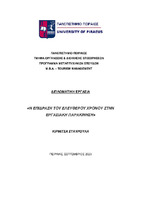Η επίδραση του ελεύθερου χρόνου στην εργασιακή παρακίνηση

View/
Keywords
Θεωρία αυτοδιάθεσης ; Ελεύθερος χρόνοςAbstract
The amount of time an individual spends on their work is an essential factor when considering job choices. Equally important is the amount of free time an employee has for rest and personal life "after work." The promise of having free time in one's life becomes a crucial parameter for selecting a job, as it serves as a motivator for employees to perform their best at work. This dedication to their work allows them to be rewarded with valuable free time, during which they can focus on activities they consider meaningful, such as spending time with family, self-improvement, exercise, and leisure.
To investigate the relationship between free time and motivation, this research began with a literature review on both variables. Subsequently, a questionnaire was designed and distributed to 300 individuals with varying ages, marital statuses, and education levels. Participants provided their responses to the questionnaire, and the data were then analyzed using IBM SPSS Statistics (version 27).
The results of the analysis revealed a direct correlation between the two concepts: Free time emerged as a significant parameter that motivates individuals, both in their job selection process and in their overall performance at work.


